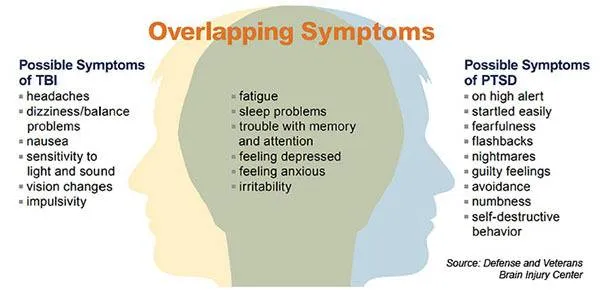Many veterans and first responders face the dual challenges of Post-Traumatic Stress Disorder (PTS) and Traumatic Brain Injuries (TBIs), including concussions. These conditions often share similar symptoms, making it difficult to differentiate between them. Unfortunately, this overlap can result in missed diagnoses and incomplete treatment plans.
Overlap Between Concussions and PTS
When someone experiences a traumatic event, whether it’s a combat-related incident, a car accident, or a fall, they may develop PTSD or sustain a concussion (or both). While these conditions have distinct causes, they share many overlapping symptoms that can complicate the diagnostic process.
Common Symptoms of Concussions (TBI):
- Headaches
- Dizziness or balance problems
- Nausea
- Sensitivity to light and sound
- Vision changes
- Impulsivity
Common Symptoms of PTS:
- Feeling on high alert
- Startling easily
- Fearfulness
- Flashbacks
- Nightmares
- Guilt or shame
- Avoidance behaviors
- Self-destructive tendencies
Shared Symptoms Between Concussions and PTS:
- Fatigue
- Sleep problems
- Trouble with memory and attention
- Feeling anxious or depressed
- Irritability
The image above highlights these overlapping symptoms, showing how they can blur the lines between the two conditions. Recognizing these shared symptoms is essential for accurate diagnosis and treatment.
Why Veterans and First Responders Are at Risk for Overlooked Concussions
Many veterans and first responders are familiar with PTS, but few realize they may also be suffering from the lingering effects of a concussion. This lack of awareness can lead to incomplete care. Here’s why:
Concussions Are Often Undiagnosed: In high-stress, high-risk environments, physical injuries like concussions may go unnoticed. The focus is often on mental health, overlooking potential head injuries.
Symptoms Can Be Misattributed: Many of the symptoms attributed to PTS—like irritability, sleep disturbances, and memory problems—can also be caused by a concussion. Without proper screening, healthcare providers may miss the underlying cause.
Delayed Treatment: If a concussion goes unrecognized, it can prolong recovery and worsen mental health symptoms. Early diagnosis and targeted interventions are crucial.
Why Proper Screening Matters
Screening for concussions alongside PTS evaluations is vital for veterans and first responders. Here are a few reasons why this dual assessment approach is essential:
Accurate Diagnosis: Understanding whether symptoms are related to PTS, a concussion, or both can significantly impact treatment plans.
Targeted Treatment: Concussion management often includes physical therapy, vestibular therapy, and cognitive rehabilitation, which differ from PTS treatments.
Improved Outcomes: Properly addressing both conditions can accelerate recovery and improve overall quality of life.
Challenges in PTS Treatments Due to Undiagnosed TBIs
Post-Traumatic Stress (PTS) treatments, such as Eye Movement Desensitization and Reprocessing (EMDR), are powerful tools for addressing trauma. However, some patients find these therapies challenging or ineffective, which can sometimes be attributed to undiagnosed or overlapping symptoms of a Traumatic Brain Injury (TBI), such as a concussion.
Patients experiencing difficulties with therapies like EMDR may struggle due to symptoms more commonly associated with concussion, such as heightened sensitivity to busy or stimulating environments, difficulty focusing, or increased emotional reactivity. These symptoms, while often mistaken for PTS, may require a different clinical approach.
It takes a skilled clinician to discern between PTS and TBI, as the symptoms of these conditions can significantly overlap. Proper assessment and understanding of the patient’s history—including potential head injuries—are crucial. By addressing the underlying TBI, clinicians can tailor treatment plans more effectively, potentially combining PTS-focused therapies with interventions that address the neurological impacts of concussion.
How We Helps Veterans and First Responders in Bedford
At Bortnick Therapy Enterprises, we specialize in treating veterans and first responders who may be dealing with the complex interplay of PTS and concussions. Our comprehensive evaluation process ensures we leave no stone unturned in identifying the root cause of your symptoms.
We understand the unique challenges that veterans and first responders face. Our goal is to provide personalized care that addresses both physical and mental health to help you regain control of your life.
Don’t Overlook Concussions
Understanding the overlap between concussions and PTS is critical for veterans and first responders seeking effective treatment. If you suspect that a head injury may be contributing to your symptoms, don’t hesitate to seek a comprehensive evaluation.
By addressing both conditions, we can help you achieve better health outcomes and improve your quality of life. If you’re ready to take the next step toward recovery, contact us today to schedule your assessment.


